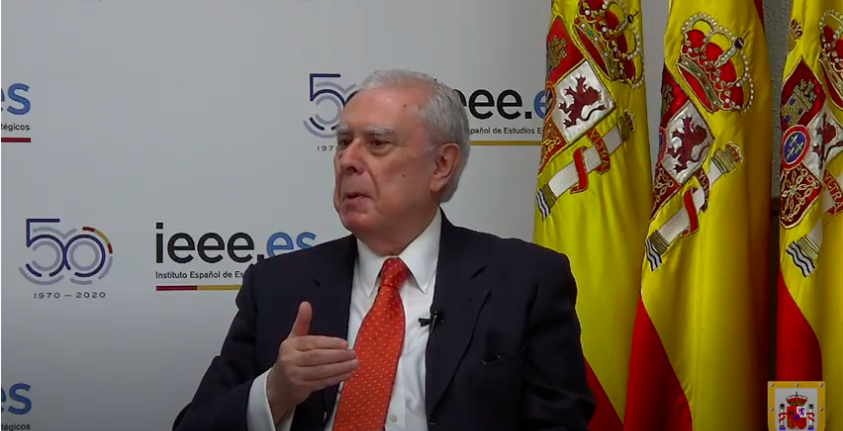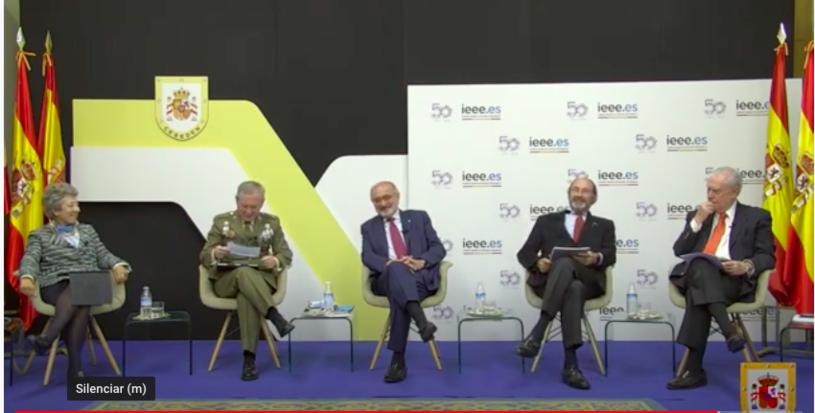Geostrategy and security in times of pandemic

he arrival of the COVID-19 and its global spread has affected our daily lives, our way of relating to others and even the way we work. But it has also created a new climate of tension at the international level that has affected international relations.
The coronavirus is playing a leading role in 2020 where the social, economic, health and political consequences have yet to be seen, and the majority of states continue to fight against a threat that is spreading silently but which poses a great risk to the population, as has already been seen in the numbers of infections and deaths in many countries.
The round table organised by the Royal Academy of Moral and Political Sciences, in collaboration with the Spanish Institute of Strategic Studies of the CESEDEN, focused on the geostrategy and security of states.
Under the name "Geostrategy and security in times of pandemic: Spanish reflection for uncertain times", the conversation was attended by Francisco José Dacoba, Emilio Lamo de Espinosa, Araceli Mangas and Javier Rupérez.
The world before the COVID-19 crisis was already very complex, but with this pandemic the challenges have multiplied and, if before the main concern regarding citizen security was terrorism and migratory crises, now it is a virus that began in the remote Chinese province of Hubei and has affected almost the entire globe. Also, the new reality society is facing is set against an abstract entity that we do not see but is there: cyberspace, where aggressions can be very serious without their consequences being visible, and this has been another point of debate at the table.

One of the questions that arises is whether the geostrategic landscape will be reconfigured. "The dynamics of transformation of the world were already there before the pandemic, but this crisis is going to accelerate some of them and slow down others," says General Dacoba, Director of the IEEE.
Terrorism and migration trends are still there and will continue to be one of the main challenges, now compounded by the weakening of multilateralism. The action of global leadership that the United States has given up, and which China may take away -but under the shadow of totalitarianism-, together with the rise of nationalism and unilateralism, is leading to a multipolar world with major asymmetries between the different actors.
For Emilio Lamo de Espinosa, president of the Real Instituto Elcano, there are two schools: Schengen is going to change or it is an accelerator of much better known trends. This acceleration is leading to a radically new world. A powerful restatement of the world, and of the economy that has to reinforce the power of states, which accentuates the risk of political authoritarianism.
Furthermore, the world is swinging towards Asia and above all China, inaugurating a new power.
Despite the unpredictability of the COVID-19, a pandemic was already among the risks Spain could face, and this was reflected in its prospective plans on the dangers by the IEEE, which established a pandemic as a threat to national security.

Araceli Mangas, a professor of public international law and international relations, has criticised the state's national security strategy which, although it recognised the possibility of pandemics, the plans and risks detected did not establish what to do and ignored the plans on dangers drawn up by the IEEE.
Communicable diseases are not only a health problem, they also have a disruptive effect on the country's economy and society, which carries a national security problem, Mangas said.
The professor wished to recall the importance of the Sahel for Spain and the European Union, and the stability of this area is necessary, but it has recently been experiencing turbulent times.
"Spain and the EU must be concerned about the collapse of neighbouring states such as Libya and Mali; Jihadist terrorism could spread, above all through Morocco and also to Spain", Mangas said.
Since the disintegration of Libya, the whole of the Sahel has been receding and violence has increased, and the Sahel is a very close border for Spain.
Javier Rupérez, the Spanish ambassador, stressed the importance of international organisations, especially the fact that the United Nations was created in 1945 after the Second World War to seek a context of cooperation and goodwill on the part of states, to "talk about cooperation and finding solutions" to all economic, social and health problems.
Rupérez has established three unknowns about Spain's and the EU's position: the role in NATO with Russia and its imperial vision; relations with the United States after Joe Biden's victory and Trump's defeat "which has brought a defeat for nationalism, protectionism and isolationism"; and the European Union's strategic lines on community security.









